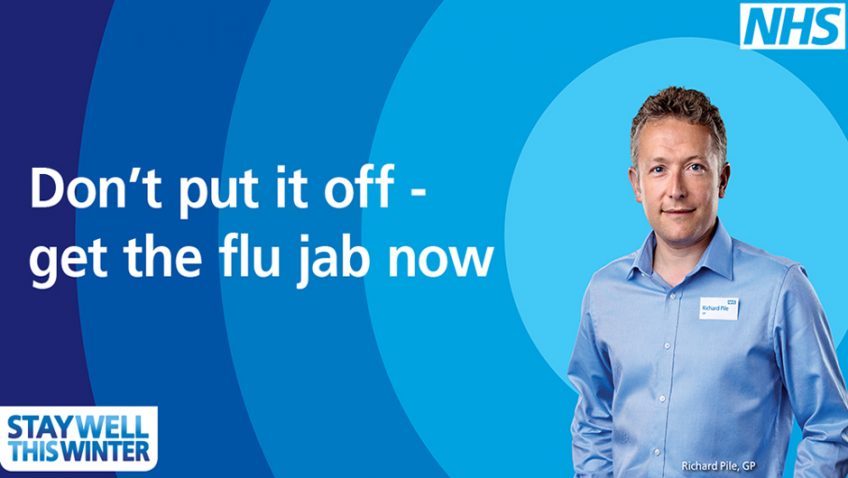Public Health England urges those at highest risk of flu to get vaccinated
People who are the most vulnerable to flu are being urged to get their free vaccination ahead of the winter period when the virus is most common.
The Chief Medical Officer has warned that flu and complications associated with it cause 8,000 deaths on average a year in England. Around 6,000 of these are people with heart and lung disease.
This year, more people than ever – around 21 million – will be offered the vaccination.
The national drive marks the start of Stay Well This Winter, an initiative from Public Health England and NHS England to help the most vulnerable people prepare for winter and avoid having to visit hospital due to common winter illnesses.
Professor Dame Sally Davies, Chief Medical Officer said:
“The harsh reality is that flu can kill and the best way to protect yourself is to get the jab.
“With more people eligible than ever before and the vaccine available in more locations, people should protect themselves and those around them from flu. Taking a few minutes to get the jab could save your life this winter.”
The vaccine is the best form of protection against flu. Vaccinating those who are most likely to get flu also offers a protective effect for the rest of the population by reducing the overall spread of the virus.
People with respiratory diseases like COPD, emphysema or asthma are seven times more likely to die if they catch flu; and people with cardiovascular problems like chronic heart disease or angina, or those who have had a stroke, are 11 times more likely compared with those who don’t. The risk is far worse for those with chronic liver disease, who are 48 times more likely to die if they get flu.
Professor Paul Cosford, Director for Health Protection and Medical Director at Public Health England, said:
“For someone with a long term health condition like asthma or COPD, flu has the potential to turn very serious. Last winter, uptake increased amongst people in clinical risk groups and we want to continue this trend. We want as many eligible people as possible to get their jab, as it is the best way to protect everyone from flu and minimise the burden on the NHS during the season when it faces the most pressures.”
Around 6.3 million people under 65 in England have a long-term health condition and are more at risk of suffering potentially fatal complications from flu. Last year, uptake amongst high risk groups increased by 3.5% amongst eligible people.
Those who are eligible for the free flu vaccine include:
- Adults over 65
- People with long-term health conditions, including asthma, Chronic Obstructive Pulmonary Disease (COPD), bronchitis, emphysema, diabetes, kidney or liver disease or diabetes
- People with neurological conditions like cerebral palsy, multiple sclerosis. motor neurone disease or Parkinson’s
- People who have Alzheimer’s, a learning disability or had a stroke
- Pregnant women
- Children aged 2 and 3, as well as pupils in reception class and school years 1 to 4.
And if you are the main carer of an older or disabled person you may also be eligible for the free flu jab – speak to your GP.
New data also reveals the pressure that flu places on the NHS, highlighting the importance of prevention. Over 1,000 people were admitted to Intensive Care or High Dependency Units with confirmed flu last winter, with 133 of these cases being fatal.
Another way of protecting vulnerable adults is to vaccinate children, who are ‘super-spreaders’ of the vaccine.
Children in school year 4 will be offered the vaccine for the first time and children over age 4 in reception year can get their vaccine in school.
Dr. Rosemary Leonard, GP and broadcaster, said:
“Young children’s bodies can find it hard to cope with flu, so it is especially important to protect them with the vaccine. The nasal spray is a quick, effective and painless alternative to needles.
“Once ill, children also tend to spread infection more than adults. The vaccine helps to reduce the spread of flu to other more vulnerable family members, such as grandparents.”
To get your vaccine or to find out if you are eligible, contact your GP, pharmacist or midwife for more information. For more details including information in alternatve formats on how to help you and your family to stay well this winter, visit nhs.uk/staywell




